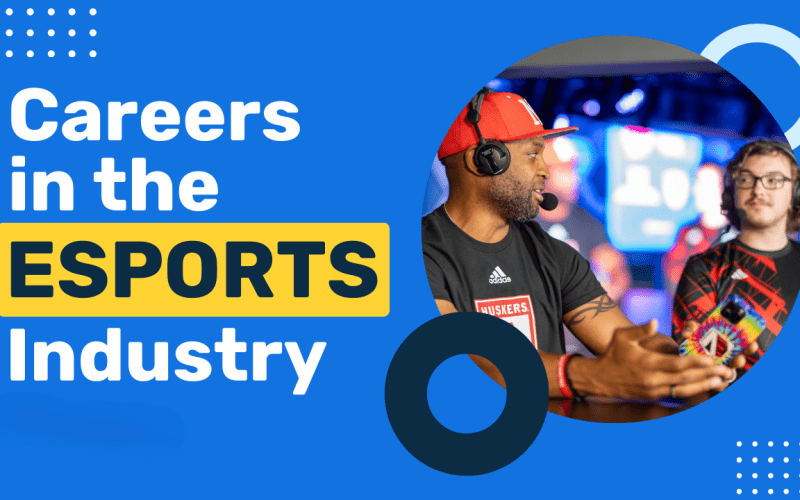Introduction
The esports industry has exploded in popularity, making it one of the fastest-growing sectors in entertainment. From professional gaming to roles in management, marketing, and production, esports offers various career paths for enthusiasts. However, breaking into this competitive field requires more than just a passion for gaming. In this guide, we’ll walk you through five essential tips on how to start a career in esports.
The Rise of Esports Careers

Esports has grown rapidly in recent years, becoming a global phenomenon. What started as a hobby for many has turned into a serious career option for people of all ages. Major tournaments, large sponsorships, and a huge following on social media have helped esports become a multi-billion-dollar industry. This growth has created many job opportunities, from professional players to event organizers and content creators. As the industry continues to expand, more career paths are opening up for those interested in working in esports.
The Growing Popularity of Esports

Esports is becoming more popular every day. What was once a small niche of competitive gamers is now a worldwide trend, attracting millions of fans. Major gaming tournaments are streamed live, with huge prizes for the winners. People of all ages are tuning in to watch their favorite players or teams compete. This has helped esports become a respected and profitable industry, with opportunities not only for players but also for those interested in management, production, and marketing. As the audience for esports grows, so do the chances for a successful career in this exciting field.
How Esports is Changing Traditional Careers

Esports is also changing the way people think about traditional careers. In the past, people would only consider sports, entertainment, or business jobs for a career. Today, the rise of esports means that new and unique career options are available. Roles like game developers, streamers, social media managers, and event coordinators are all now part of the esports world. This change is opening up opportunities for young people to follow their passion for gaming while still having a stable and rewarding job.
Benefits of a Career in Esports

A career in esports offers many exciting benefits. First, it allows you to do something you love, such as gaming, while making a living. Whether you’re a player, coach, content creator, or event manager, working in esports gives you the chance to be part of a dynamic and fast-paced environment. Many esports jobs also offer flexibility, with opportunities to work from home, stream online, or travel to big events. Plus, as the industry grows, the potential for job stability and advancement increases.
The Role of Skills in Esports Careers

Skills play a crucial role in getting a career in esports. Different positions in the esports industry require different skills. For example, players need exceptional gaming skills, while content creators need to know how to make engaging videos. Event organizers need to understand logistics and planning, and managers must be good at leading teams and handling finances. By developing specific skills that match your chosen career path, you’ll be more competitive and prepared for opportunities in esports.
5 Tips to Start a Career in Esports

1. Understand the Esports Landscape
Before diving into a career in esports, it’s crucial to understand the industry landscape. Esports is more than just playing games competitively; it includes roles in marketing, event management, content creation, coaching, and more. Take the time to research different organizations, teams, and industry trends. This knowledge will help you identify where your skills can best fit in the esports ecosystem.
2. Develop Relevant Skills
Like any industry, esports requires specific skills. Depending on your desired role, you may need to develop technical, creative, or business-oriented skills. For instance:
- Content Creation: Learn video editing, graphic design, or streaming skills if you want to produce engaging esports content.
- Event Management: Study marketing and logistics for organizing tournaments and events.
- Coaching and Analysis: Understanding game mechanics, strategy, and analytics is essential for coaching and analysis roles. Investing in relevant skills early on will make you more competitive and open doors to various job opportunities in the field.
3. Build a Network in the Esports Community
Networking is invaluable in esports. Connecting with industry professionals can provide insight into job opportunities, mentorship, and collaborations. Consider joining esports forums, attending tournaments, or participating in online communities to connect with others who share your interests. Platforms like LinkedIn, Twitter, and Discord are excellent for engaging with professionals and staying updated on industry news and trends.
4. Gain Hands-On Experience
Experience in esports, even at a beginner level, can set you apart from other candidates. Consider volunteering at local events, working as a moderator for esports streams, or managing a small team. These experiences provide valuable skills and insights and help you understand the fast-paced environment of the esports industry. Internships, even unpaid ones, can also serve as a stepping stone, allowing you to gain relevant experience and prove your commitment to your career path.
5. Stay Updated on Industry Trends
The esports industry evolves rapidly. Staying informed about the latest trends, technologies, and game titles is vital. Subscribe to industry news sites, follow esports influencers, and engage with content creators who discuss the latest in esports. This will keep you knowledgeable and prepared to adapt as the industry changes.
Building Experience Through Practice

One of the best ways to start a career in esports is by gaining hands-on experience. Just like any job, practice and learning are key to success. If you want to become a professional player, you need to practice regularly and understand the game deeply. If you’re aiming for a career in content creation or event management, start small by creating your own streams or volunteering at local events. Gaining experience will help you improve your skills and make important connections that could lead to job opportunities in the future.
The Power of Networking in Esports

Networking is an essential part of building a career in esports. By connecting with others in the industry, you can learn from their experiences and find out about job openings or collaborations. Attend esports events, both online and in person, and use social media to follow industry leaders and organizations. Platforms like LinkedIn, Discord, and Twitter are perfect for joining discussions and building relationships with people who share your passion. Networking can open doors and help you stay informed about the latest trends and career opportunities in the esports world.
The Value of Education and Training

Although esports is often associated with gaming skills, education and training can play a big role in your career. Many universities and online platforms now offer courses in game design, esports management, and streaming. By taking these courses, you can learn more about the business side of esports, how to manage teams, or how to create content that attracts viewers. Investing in education will give you a better understanding of the industry and make you more attractive to potential employers.
Challenges in Starting a Career in Esports
While the esports industry offers many opportunities, it also comes with challenges. One of the biggest hurdles is the high level of competition. Many people are eager to break into the industry, which means you need to stand out. Gaining experience, building a strong network, and constantly improving your skills are essential to overcoming these challenges. Additionally, some esports careers, such as being a professional player, may require a lot of time and effort, with long hours of practice and performance pressure.
The Future of Esports Careers

The future of esports careers looks bright as the industry continues to grow and evolve. More games are being developed for competitive play, and esports tournaments are gaining more viewers each year. With the rise of technology like virtual reality and better streaming platforms, the esports world will likely see even more exciting developments. As the industry expands, new roles will continue to appear, and there will be more chances for people to turn their passion for gaming into a career. If you’re thinking about starting a career in esports, now is a great time to get involved.
Looking Ahead: Esports as a Long-Term Career
As esports continues to grow, the potential for a long-term career in the industry is stronger than ever. Unlike many traditional sports, where players often have short careers, esports allows players and other professionals to work in the field for much longer. Many esports professionals transition into other roles, such as coaching, commentating, or content creation, after their playing careers end. This means that a career in esports can offer long-term stability and opportunities for growth, making it an exciting field to pursue.
Analysis Table: Essential Skills for Different Esports Roles
| Role | Skills Required | Description |
|---|---|---|
| Content Creator | Video editing, social media management | Produces engaging content to grow an audience and promote eSports |
| Event Manager | Marketing, logistics, project management | Organizes tournaments, handles logistics, and promotes events |
| Coach/Analyst | Game strategy, analytical thinking, communication | Analyzes gameplay and trains players on strategies |
| Team Manager | Leadership, people management, budgeting | Manages player schedules, finances, and team operations |
| Game Caster/Commentator | Public speaking, game knowledge | Provides live commentary and insights during esports events |
Comparative Table: Traditional Sports Careers vs. Esports Careers
| Aspect | Traditional Sports | Esports |
|---|---|---|
| Training Requirements | Often requires physical training | Primarily requires mental training and strategy |
| Audience Demographics | Broad age range, with family appeal | Predominantly younger audience |
| Required Skills | Physical endurance, teamwork | Analytical skills, game knowledge |
| Event Venues | Stadiums, sports arenas | Both online platforms and physical arenas |
| Entry-Level Opportunities | Limited internships | Flexible options, including online opportunities |
Conclusion
A career in esports offers a unique opportunity to turn your passion into a profession. By understanding the industry, developing relevant skills, networking, gaining experience, and staying updated on trends, you can set yourself up for success in this competitive field. Whether you aim to be a content creator, team manager, or coach, these tips will help you make informed decisions on your journey into esports.











